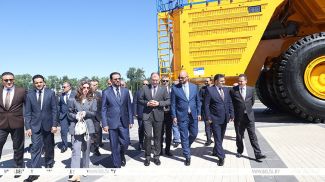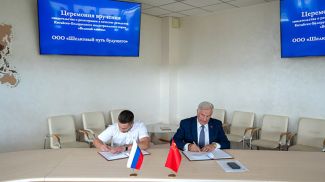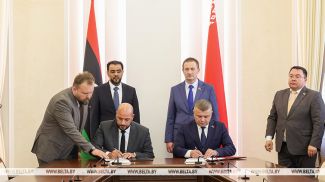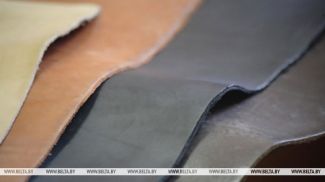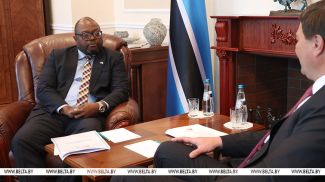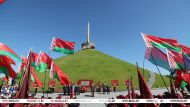MINSK, 20 June (BelTA) – Prime Minister of Belarus Roman Golovchenko and Uzbekistan Prime Minister Abdulla Aripov visited the Hi-Tech Park on 20 June, BelTA has learned.
Roman Golovchenko and Abdulla Aripov were made familiar with the operation of the Hi-Tech Park, legal conditions for doing business in the park, and with products of the resident companies. In particular, LWO Company presented the payment system Oplati. R-NOX Company showcased a platform for monitoring the quality of air in cities and industrial areas. KometaRad presented a software suite for processing, 3D reconstruction, transmission and storage of medical diagnostic images. Gmartikun presented a house intercom system. LACIT representatives talked about automation and robotization of business processes of industrial enterprises. LeverX representatives talked about the development and assimilation of software solutions in the manufacturing sector. Apart from that, future cooperation prospects were discussed.
The visit of the prime ministers to Belarus' Hi-Tech Park was timed to the session of the Eurasian Intergovernmental Council, which is due to begin in Minsk today. The heads of government of the Eurasian Economic Union member states will discuss the introduction of goods marking with identification means in the Eurasian Economic Union, the establishment of commissions for manufacturing cooperation and import substitution in high-priority and high-tech branches of the manufacturing sector, and the state of competition on transboundary markets. Apart from that, the agenda includes matters concerning the development of transport infrastructure, economy digitization, digital trade, and cooperation in customs affairs.
Uzbekistan has been recently making considerable efforts to accelerate the development of the information technology industry by means of encouraging young citizens to pursue IT careers and by means of attracting foreign investments and competences. The comparatively young population in Uzbekistan is a good basic condition for the development of this industry: citizens under 30 constitute 54% of the total population of 35 million. Uzbekistan is taking steps to develop the education system, which is largely geared towards information and digital technologies. Over 20 branches of foreign universities from Russia, South Korea, USA, UK, Italy, India, Japan, and Singapore work in the country. The Uzbekistan-UAE project “One million Uzbek programmers” is being implemented. It offers a free online platform for learning how to program. A total of over 2.5 million participants are registered in the program, including over 1.1 million who have already finished their training (90% of the participants are school students).
An IT Park was established in Uzbekistan's capital Tashkent in 2019. It is an extraterritorial free economic zone for IT companies with integration with scientific and educational institutions as well as a complex of objects, buildings, and structures for ensuring the launch and commercialization of promising startups. To create the IT Park, Uzbekistan heavily borrowed from the practices implemented in Belarus' Hi-Tech Park.
Belarus' Hi-Tech Park successfully operates on the Uzbek market. The Hi-Tech Park exported $4.6 million worth of services to Uzbekistan in 2021 and $1.1 million worth of services in January-April 2022. In Uzbekistan Belarusian IT companies are primarily interested in digital projects in the banking industry, healthcare, environmental protection, and automation of industrial processes.
Belarus' Hi-Tech Park was founded in 2005 by an ordinance of the head of state and is a leading cluster of information and high technologies in Eastern Europe and the Commonwealth of Independent States (CIS). The state supports Hi-Tech Park resident companies by providing tax concessions, English law tools, the possibility of free capital transfer, transparent regulation of the blockchain sphere and other attractive conditions for doing business. The Hi-Tech Park's legal regime applies to Belarus' entire territory. Over 100 Hi-Tech Park companies operate outside Minsk.
The Belarus president's Digital Economy Development Ordinance No.8 of 21 December 2017 fueled Hi-Tech Park growth across the board. Thanks to accomplishments of the Hi-Tech Park Belarus is well ahead of Russia, USA, China, India, Poland, and many other countries in IT export per capita. The key indicators of the Hi-Tech Park's work: 1,064 companies, over 40% of the resident companies are companies with foreign capital.
Belarus' Hi-Tech Park is export-oriented. Export accounts for 85-90% of the entire output. The United States of America and the European Union are the main markets. The Hi-Tech Park attracts major foreign companies to Belarus. The Hi-Tech Park is home to 122 development centers of foreign corporations. The Hi-Tech Park's priority areas of work include 37 fields starting with cutting-edge artificial intelligence solutions and ending with the development of high-quality software, engineering solutions, games and mobile apps, IT solutions for healthcare, agriculture, finance, banking software, laser technologies and optics.
Belarus' Hi-Tech Park originally relied on outsourcing. The adoption of the Digital Economy Development Ordinance enabled conditions conducive to a product business model: IT companies make their own products and market them to a broad range of consumers. Thus, Belarus' IT sector has changed not only quantitatively but qualitatively. It was particularly noticeable amid the coronavirus pandemic in 2020-2021. Hundreds of new companies with new products and business areas were registered in the Hi-Tech Park and offered multiple footholds for the entire Belarusian IT industry. The Hi-Tech Park's success hinges on the constant inflow of highly qualified professionals instead of tax concessions. About 15,000 university students with the necessary qualifications graduate every year.




